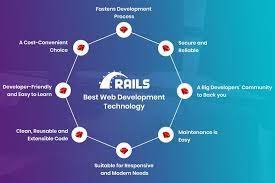Ruby on Rails (RoR) has emerged as a popular choice for website development, and for good reason. Its simplicity, flexibility, and robustness make it a preferred framework among developers and businesses alike. In this article, we will explore the seven key benefits of choosing Ruby on Rails for your website development needs.
1. Rapid Development
One of the standout features of Ruby on Rails is its ability to facilitate rapid development. Its elegant syntax and conventions allow developers to write clean, concise code, reducing the development time significantly. This means you can get your website up and running faster, giving you a competitive edge in the digital landscape.
2. Cost-Effectiveness
RoR is an open-source framework, which means it’s cost-effective for businesses. There are no hefty licensing fees associated with it, making it an attractive choice for startups and small businesses with limited budgets. Additionally, its rapid development capabilities translate into reduced development hours, further saving costs without compromising on the quality of the website.
3. Scalability
Scalability is a critical factor for any website, especially as your business grows. Ruby on Rails is designed to handle scalability effortlessly. Whether you’re expecting a surge in traffic or planning to expand your website’s features, RoR’s modular approach and scalability options ensure your website can grow seamlessly without compromising its performance.
4. Robust Community Support
RoR boasts a vibrant and active community of developers and enthusiasts. This means you have access to a vast pool of knowledge, resources, and plugins. If you encounter an issue or need guidance, the community is there to help. This robust support system ensures that your website development process remains smooth and hassle-free.
5. High Security Standards
Security is paramount in the digital age, and RoR takes it seriously. The framework comes with built-in security features, making it inherently secure. Additionally, the community regularly updates and patches security vulnerabilities, ensuring your website is protected against evolving cyber threats. This focus on security gives you peace of mind and builds trust among your users.
6. Flexibility and Versatility
RoR provides developers with the flexibility to create a wide range of applications, from simple websites to complex e-commerce platforms and web applications. Its versatility allows developers to customize and extend functionalities according to specific project requirements. Whether you’re building a blog, a business website, or an online marketplace, RoR can cater to diverse needs.
7. SEO-Friendly
Search engine optimization (SEO) is crucial for the online visibility of your website. RoR’s clean and semantic code, along with its support for meta tags and search-friendly URLs, makes it inherently SEO-friendly. This means your website is more likely to rank higher in search engine results, driving organic traffic and increasing your online presence.
Conclusion
Choosing Ruby on Rails for your website development offers a multitude of advantages. Its rapid development capabilities streamline the process, saving both time and money. The clean and readable code enhances collaboration among developers, ensuring efficient teamwork. With a vast library of ready-to-use plugins, RoR simplifies complex tasks, promoting innovation. Its robust security measures protect your website from cyber threats, ensuring a safe user experience. The scalability of Ruby on Rails allows your website to grow seamlessly with your business, accommodating increasing user demands. Furthermore, RoR’s strong community support ensures continuous updates and solutions to challenges. For all these reasons, opting for a Ruby on Rails development company guarantees a cutting-edge, secure, and scalable website tailored to your needs.
Frequently Asked Questions (FAQs)
Q1: Is Ruby on Rails suitable for small businesses?
Yes, Ruby on Rails is an excellent choice for small businesses due to its cost-effectiveness and rapid development capabilities.
Q2: Can RoR handle large-scale applications?
Absolutely. Ruby on Rails is designed to be highly scalable, making it suitable for both small-scale websites and large, complex applications.
Q3: Is RoR difficult to learn for beginners?
While every programming language has a learning curve, RoR’s clean syntax and extensive documentation make it relatively beginner-friendly.
Q4: How often does the RoR community release updates?
The RoR community regularly releases updates and patches, ensuring the framework stays secure and up-to-date with the latest industry standards.
Q5: Are there specific hosting requirements for RoR applications?
RoR applications can run on most standard web hosting platforms, making it convenient for developers to deploy their projects.



